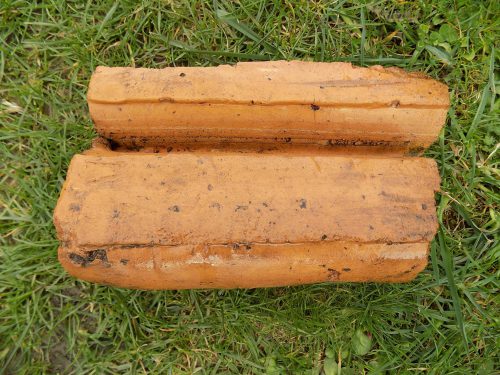Dougal Winchburgh
— 05/05/2022Found on the site of the old Manuel Brickworks, Whitecross. Winchburgh Brickworks, Winchburgh, West Lothian. . . . .
Rentonhall Tileworks, near Haddington, East Lothian.
Alexander Dougal – 1828 – 1899, as a young man he was at Rentonhall Brickworks, Morham, East Lothian, (learning the trade?) About 1859 he was at Forgandenny Brick & Tileworks as a tenant. By 1869 he was back in Linlithgow and Winchburgh Brick and Tile works had begun. With 2 of his sons in the business, Winchburgh Brickworks continued beyond Alexander’s death in 1892.
Below – 09/08/1810 – Caledonian Mercury – Lands in East Lothian to be sold – The lands of Glasscoats and Rentonhall lying in the Parish of Moreham and county of Haddington.
… The lands contain both coal and lime and a very fine white freestone and an abundance of excellent brick clay; so that, besides possessing great means of improvement within themselves, their vicinity to the town of Haddington and the constantly increasing demand for freestone and bricks there, will form a valuable addition to the yearly return from the property …

1840 – 1850s – Owned by Kenneth McKenzie.
24/10/1849 – The Scotsman – To be sold. The Estate of Rentonhall in the Parish of Moreham and Country of Haddington, extending to about 130 imperial acres. … On the Estate there is a brick and tile works in full operation, the engine, machinery &c would be sold at valuation. The clay field is large and its quality very fine, containing a fire clay of a durable nature well adapted for roofing tiles …
11/01/1851 – Perrys Bankrupt Gazette – Kenneth McKenzie of Rentonhall, tile manufacturer. 17th Jan. 7th Feb. Twelve. George Inn, Haddington. Claims by 7th July.
Below – 29/07/1851 – Edinburgh Evening Courant – Rentonhall, including the tileworks for sale.

Below – 1853 – Rentonhall Tileworks, Haddington and abandoned before 1893?

1853 – 1854 – ScotlandsPlaces – Rentonhall Tileworks – Works for the manufacture of drainage tiles, worked by steam power. The tiles are used by the proprietor John Reid Esqr.
14/03/1860 – Glasgow Herald – The firm of Allan Livingston & Son carry on business as brick and tile manufacturers at Portobello and Rentonhall, near Haddington. George Young, smith and carter, Haddington, supplied them with coal for the works at Rentonhall. He brings action against them for the amount of his account and is met by the defence that the Sheriff of Haddington has no jurisdiction over them, the defenders pleading that “neither of the defenders having any residence or domicile in the county of Haddington, they are not subject to the Sheriff’s jurisdiction for a civil debt.” The defender says that he is the sole partner of the firm and the only lessee of the brickwork, and that his father is not a partner; that there is no company, and that he could not be cited at the office of the company at Rentonahall. That office was a temporary erection or shed, as the defender called it; but he paid his workmen there, he had a clerk there, and he occasionally went out and transacted business at the place. He had no house, and never resided at the place, and never slept in Haddington, but always returned to Portobello. Both the Sheriffs sustained the defence of want of jurisdiction. Today the Court recalled their judgments.
The Lord President said that Allan Livingston & Son was a company, and a company carrying on business at Rentonhall, in the county of Haddington, where they had a brick and tile work. At that place, they had an office, great or small. The pursuer furnished coal for their establishment at RHentonhall; and he cites the company, Allan Livingston & Son, at their place of business, where they paid their workmen, and when he delivered the coal. The defender pleads that he is not a company, that he is only an individual, and that his father, old Livingston, had retired. It is not said that the pursuer knew of this. The defender had taken the name of Allan Livingston & Son. I hat was not his own name. it was his own name and something else. It was the name of a company, and he was not entitled to plead the reverse after he had adopted it at name. Lord Ivory concurred. He considered this to be a dishonest defence. The defender carried on business as a firm, and he received coal from the pursuer as a firm, and he refuses to pay them because he is not a firm. It is not in his mouth to plead that. The others also concurred, allowing the expenses in this Court.
Below – Long narrow brick with frog found on-site measuring 14″ x 4 1/2″ x 3″

Below – The following photographs of Rentonhall Tileworks and bricks and tiles found on site were taken by Ian Suddaby in March 2017.
 .
. 
.
 .
. 
.
 .
. 
.
 .
. 
.

The following family information is supplied by Rose Williams.